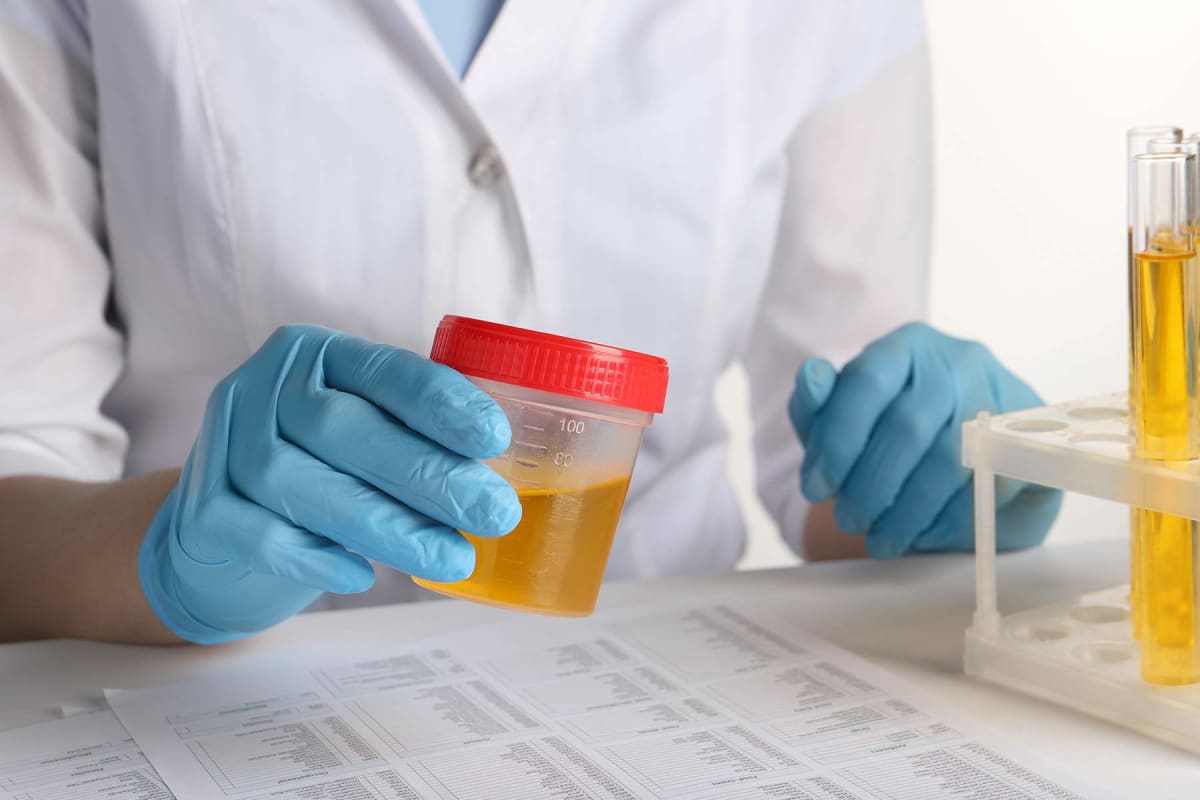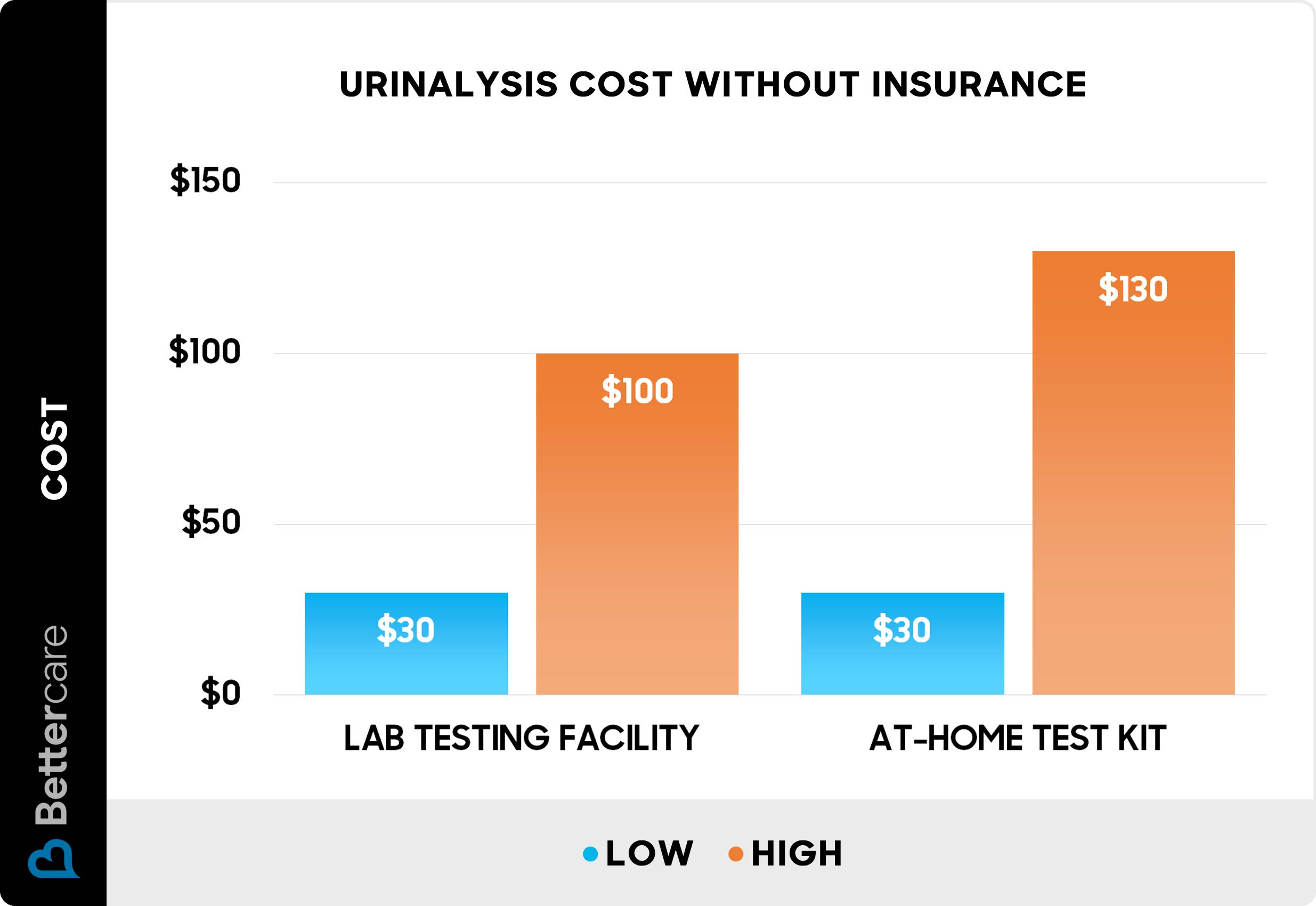
How much does a urinalysis cost?
How much does a urinalysis cost?
$30 – $100 average cost
Urinalysis cost
A urinalysis costs $30 to $100 on average at a lab, with some comprehensive tests costing up to $250. Urinalysis prices depend on the type of test, your location, and your insurance coverage. An at-home urine test costs $30 to $130, including the fee to mail the sample to a certified lab for processing.

| Test facility | Average cost (without insurance) |
|---|---|
| Lab testing facility (LabCorp, Quest, etc.) | $30 – $100 |
| At-home test kit | $30 – $130 |
What is urinalysis?
Urinalysis is a simple test that examines urine through visual, chemical, and microscopic analysis to detect health conditions like urinary tract infections, kidney disease, diabetes, and liver problems. The test checks urine appearance (color, clarity, odor), measures substances like glucose and protein using dipstick strips, and examines cells, bacteria, and other microscopic elements.
Urine tests are commonly used for routine health screening, diagnosing medical conditions, and monitoring existing health issues, as well as for specialized testing like drug screening and pregnancy detection.
Urinalysis price by type
The cost of a urinalysis varies significantly depending on the test type, ranging from simple dipstick tests costing $10 to $30 to more comprehensive microscopic examinations costing up to $100. A more detailed analysis that requires microscopic evaluation and specialized testing costs the most due to the additional laboratory processing time and technical expertise required.
The table below shows the average costs for different types of urine tests, from basic screening to specialized diagnostic procedures:
| Test type | Average cost (without insurance) |
|---|---|
| Basic urinalysis (dipstick) | $10 – $30 |
| General urinalysis | $30 – $50 |
| Complete urinalysis with microscopic exam | $30 – $100+ |
| Complete urinalysis with reflex culture | $30 – $70 |
| 24-hour urine protein analysis | $20 – $65 |
| At-home UTI test strips | $10 – $25 |
| Pregnancy test | $5 – $10 (at-home test) $20 – $60 (healthcare provider) |
| Urine drug screen | $15 – $50 (at-home test) $50 – $150 (healthcare provider) |
*Lab fees only
Each urine test type serves different diagnostic purposes and involves varying levels of laboratory complexity:
Basic urinalysis (dipstick): A basic dipstick urine test costs $10 to $30 without insurance. It uses reactive paper strips that change color to detect glucose, protein, blood, nitrites, leukocyte esterase, and pH levels, providing immediate results for quick screening in clinical settings.
General urinalysis: A standard urinalysis costs $30 to $50 and combines dipstick testing with a visual examination of urine color, clarity, and odor, plus a basic assessment of cellular elements for more comprehensive diagnostic information.
Complete urinalysis with microscopic exam: This comprehensive test costs $30 to $100+ and includes full chemical analysis, visual inspection, and detailed microscopic examination of urine sediment to identify bacteria, yeast, crystals, casts, and abnormal cells that indicate kidney disease or other conditions.
Urinalysis with reflex culture: This is a comprehensive examination of a urine sample to assess the presence of various substances and indicators of urinary tract health. It costs $30 to $70, combining a standard urinalysis with further testing if certain abnormalities are detected.
24-Hour urine protein analysis: This specialized test costs $20 to $65 and requires collecting all urine over 24 hours to measure total protein excretion, providing the most accurate assessment of kidney function and protein loss.
At-home UTI test strips: These convenient screening tools cost $10 to $25 and check for nitrites and leukocyte esterase that indicate bacterial infection, providing initial screening before seeking professional medical evaluation.
Pregnancy test: A pregnancy urine test costs $5 to $10 for a digital at-home test, while professional pregnancy testing through healthcare providers costs $20 to $60.
Urine drug test: These screening tests detect illegal substances and prescription drugs using various panel configurations, with at-home kits costing $15 to $50 and professional laboratory tests ranging from $50 to $150.
Urinalysis cost factors
Several factors affect the cost of urine testing:
Insurance coverage: Insurance represents the most significant cost factor, with covered patients paying copays while uninsured patients face full retail pricing.
Location: Geographic location creates substantial price differences, as urban areas typically cost more than rural locations due to market dynamics.
Facility: The healthcare facility influences pricing, with hospitals and urgent care centers being more expensive than independent labs offering competitive rates.
Testing type: Basic dipstick tests cost less than comprehensive microscopic examinations.
Timing and urgency: Urgent tests and after-hours care cost more than scheduled appointments.
Additional services: Including additional services such as bacterial cultures and specialized testing adds to the base pricing.
Urine drug test
A urine drug test costs $15 to $50 for at-home kits and $30 to $150 for professional laboratory testing, with prices varying based on testing location and the number of substances screened.
Testing costs vary based on security requirements and intended use:
At-home test kits offer the cheapest and most convenient option for personal screening but provide only preliminary results and lack legal validity for employment or court proceedings.
Employment screening requires a certified laboratory or occupational health clinic at a higher cost to ensure chain of custody procedures for workplace drug testing requirements.
Law enforcement and legal proceedings require the most expensive testing protocols due to observed collections, strict documentation, and specialized facilities that ensure specimen integrity and legal admissibility.

What does a urine drug test show?
A standard 5-panel urine test detects the most common drugs and is commonly used for workplace screening. A 10-panel test provides a more comprehensive screening for healthcare, law enforcement, and safety-sensitive positions. Numerous recreational drugs fall outside standard panels and require specialized testing.
The following table shows which substances each standard drug panel tests for and can detect in urine.
| Drug / substance | 5-panel test | 10-panel test |
|---|---|---|
| Marijuana (THC) | ✓ | ✓ |
| Cocaine | ✓ | ✓ |
| Amphetamines | ✓ | ✓ |
| Opiates | ✓ | ✓ |
| PCP | ✓ | ✓ |
| Benzodiazepines | ✗ | ✓ |
| Barbiturates | ✗ | ✓ |
| Methadone | ✗ | ✓ |
| Methaqualone | ✗ | ✓ |
| Propoxyphene | ✗ | ✓ |
| Psilocybin (Magic mushrooms) | ✗ | ✗ |
| CBD | ✗ | ✗ |
| MDMA (Ecstasy / Molly) | ✗ | ✗ |
| LSD | ✗ | ✗ |
| Ketamine | ✗ | ✗ |
| Designer drugs / synthetic stimulants | ✗ | ✗ |
| Alcohol | ✗ | ✗ |
Questions to ask your healthcare provider
Ask your healthcare provider these important questions about urine testing:
Before the test
What type of urine test am I having and why?
How should I prepare for the test?
Do I need to avoid any foods, drinks, or medications beforehand?
About the procedure
Will I collect the sample at home, in your office, or a lab?
Do you need a clean-catch sample (midstream collection after cleaning the genital area)?
How should I store the sample if collected at home?
What are the costs for the test and sample collection?
After the test
When will my results be available?
What do my results mean for my health?
Do I need additional testing based on these results?
How often should I have urine testing?